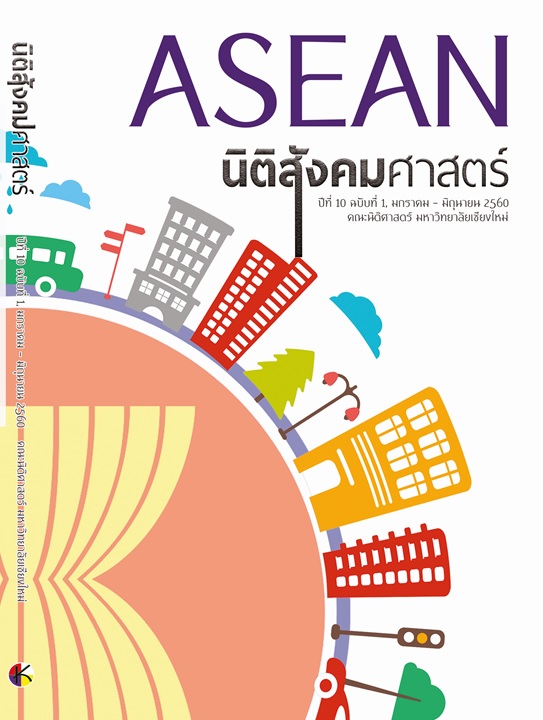กฎหมายระหว่างประเทศกับการใช้ประโยชน์จากน้ำในแม่น้ำระหว่างประเทศ: ศึกษาการสร้างเขื่อนในลุ่มแม่น้ำโขงสายหลักตอนล่าง
Main Article Content
บทคัดย่อ
งานวิจัยฉบับนี้มีวัตถุประสงค์เพื่อศึกษาหลักกฎหมายเกี่ยวกับการใช้ประโยชน์ในแม่น้ำโขงโดยเฉพาะการสร้างเขื่อนในแม่น้ำโขงสายหลักตอนล่างภายใต้ความตกลงว่าด้วยความร่วมมือในการพัฒนาลุ่มแม่น้ำโขงอย่างยั่งยืน ค.ศ. 1995 และกฎหมายระหว่างประเทศที่เกี่ยวข้องเพื่อนำมาปรับใช้ในการป้องกันผลกระทบข้ามแดนที่อาจจะเกิดขึ้นจากการสร้างเขื่อนเพื่อผลิตกระแสไฟฟ้าในแม่น้ำโขงสายหลักตอนล่าง โดยในการดำเนินการวิจัยได้ใช้ระเบียบวิจัยเชิงคุณภาพ อันประกอบด้วยการวิจัยเชิงเอกสารและการสัมภาษณ์เจ้าหน้าที่ผู้เกี่ยวข้อง
ผลการศึกษาวิจัยพบว่าการสร้างเขื่อนในแม่น้ำโขงสายหลักตอนล่างรัฐสมาชิกมีหน้าที่ต้องปรึกษาหารือล่วงหน้าก่อนดำเนินโครงการ โดยกระบวนการดังกล่าวมีผลให้รัฐริมฝั่งแม่น้ำที่เหลือสามารถให้คำแนะนำต่อโครงการแต่ไม่มีสิทธิยับยั้งการดำเนินโครงการ และความตกลงได้กำหนดให้รัฐสมาชิกมีหน้าที่ต้องป้องกันผลกระทบที่อาจจะเกิดขึ้นและมีความรับผิดชอบในกรณีที่ได้ก่อให้เกิดความเสียหายต่อรัฐอื่น แต่กระบวนการบังคับให้เป็นไปตามความตกลงไม่มีมาตรการบังคับที่ชัดเจน สำหรับข้อเสนอของการวิจัย คือ การนำกฎหมายจารีตประเพณีระหว่างประเทศและหลักกฎหมายระหว่างประเทศทั่วไป เช่น หลักการใช้น้ำอย่างสมเหตุสมผลและเป็นธรรมและหลักการไม่ก่อให้เกิดความเสียหายต่อรัฐอื่นมาปรับใช้เพื่ออุดช่องว่างของความตกลง
This research aimed to study the legal principles of utilization in the Mekong River. Principally focus on a construction of the mainstream dams in the Lower Mekong Basin under the Agreement on the Cooperation for the Sustainable Development of the Mekong River Basin A.D. 1995 and other relevance international laws in order to apply to the protection of transboundary effects that might occur from such construction for hydroelectric power in the Lower Mekong Basin. As a qualitative research, this paper is conducted by documentary research together with an interview of implicated government officers.
As a result, it is found that the member states who intends to build dams in the Mekong mainstream has duty to consult with other member states prior to the project commencement. Other member states, however, only entitle to give advice to such project not to disallow. Moreover, the agreement has prescribed the member states with duty to prevent any potential effect and responsibility in case of any damaging consequence occur to other states. Yet, such preventive measure is ineffective due to the absence of legal validity.
Suggestion arises from the study is to apply the international customary law and principles of international law such as principle of equitable and reasonable utilization and the principle of harm prevention to other riparian states to fill the gap in the agreement.
Article Details
O ความคิดเห็นใดๆ ที่ลงตีพิมพ์ใน CMU Journal of Law and Social Sciences เป็นของผู้เขียน (ความคิดเห็นใดๆ ของผู้เขียน กองบรรณาธิการ CMU Journal of Law and Social Sciences ไม่จำเป็นต้องเห็นด้วย)
O กองบรรณาธิการ CMU Journal of Law and Social Sciences ไม่สงวนสิทธิ์ในการคัดลอกแต่ให้อ้างอิงแหล่งที่มาด้วย
เอกสารอ้างอิง
กอบกุล รายะนาคร. (2540). รายงานทีดีอาร์ไอ ฉบับที่ 17 เรื่อง กฎหมายกับการจัดการทรัพยากรในลุ่มแม่น้ำโขง. (กรุงเทพฯ: ทีดีอาร์ไอ)
จตุภูมิ ภูมิบุญชู. (2545). “ปัญหาและแนวทางเกี่ยวกับการใช้น้ำอย่างสมเหตุสมผลและเป็นธรรมตามความตกลงความร่วมมือเพื่อการพัฒนาที่ยั่งยืนของลุ่มแม่น้ำโขง ค.ศ. 1995” วิทยานิพนธ์นิติศาสตรมหาบัณฑิต จุฬาลงกรณ์มหาวิทยาลัย.
สาธิต มนัสสุรกุล. “ความตกลงแม่น้ำโขง: การจัดกรอบการอภิบาลในรูป Soft Law” 44 วารสารสังคมศาสตร์ คณะรัฐศาสตร์ จุฬาลงกรณ์มหาวิทยาลัย 2, (2557), หน้า 101-116.
Boer, B. & et al., (2016) The Mekong A Socio-Legal Approach to River Basin Development. Oxon: Routledge.
IUCN. (2016). A window of opportunity for the Mekong Basin: The UN Watercourses Convention as a basis for cooperation (A legal analysis of how the UN Watercourses Convention complements the Mekong Agreement): IUCN. 27pp. Available from: http://www.3sbasin. org/publication/download-documents.html?download=99:a-window-of-opportunity-for-the-mekong-basin-the-un-watercourses-convention-as-a-basis-for-cooperation
Leb, C., (2013) Cooperation in the Law of Transboundary Water Resources. Cambridge: Cambridge University Press.
Lee, G. & Scurrah, N. (2009). Power and responsibility – The Mekong River Commission and Lower Mekong mainstream dams. A joint report of the Australian Mekong Resource Centre, Sydney University and Oxfam Australia. Available from:http://sydney.edu.au/mekong/documents/ power_and_responsibility_fullreport_2009.pdf
McCAFFREY, S., (2007) The Law of International Watercourses. Oxford: Oxford University Press.
Myint, T., (2012). Governing International Rivers Polycentric Politics in the Mekong and the Rhine. Massachusetts: Edward Elgar Publishing, Inc.
Rieu-Clarke, A. (2015). Notification and consultation procedures under the Mekong Agreement: insights from the Xayaburi controversy. Asian Journal of International Law. 5(1), 143-175.
Stephens, T., (2009) International Courts and Environmental Protection. Cambridge: Cambridge University Press.
Translated Thai References
Bhoomiboonchoo, C. (2002). Problems and prospects concerning the reasonable and equitable utilization of water and the agreement on the cooperation for the sustainable development of the Mekong river Basin 1995, Thesis in Master degree in Law, Chulalongkorn University. (in Thai)
Rayanakorn, K. (1997). TDRI Report No. 17 Legal and Management in Mekong Basin Resources. Bangkok: TDRI. (in Thai)
Manassuraku, S. (2014). Mekong Agreement: Designing Mekong Governance as Soft Law, 44 Journal of Social Sciences Faculty of Political Science Chulalongkorn University, 2, pp.101-116. (in Thai)

